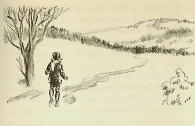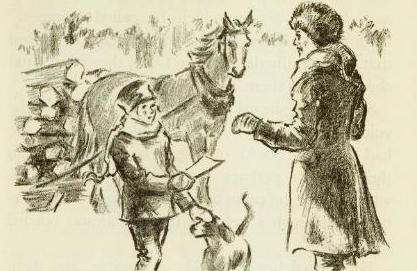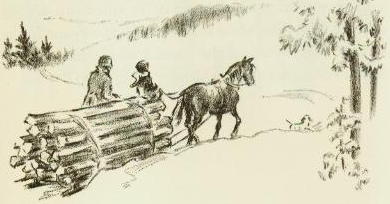
| [ The Life of Rufus Putnam ] | [ Florence Taylor's Poems ] | [ "When Mother Wrote a Column" ] | [ My Inspiration ] | [ Home ] |
Benjamin left the tavern yard and trudged soberly down the road which led to the woodlot. It was no light matter to be trusted with a letter which had already traveled so many hundred miles and which was so important to all the people of Rutland.

He knew that the men at the tavern door were watching him, and that every one of them was eager to know what news the letter had brought from General Putnam and the settlement at Marietta. He quickened his steps at the thought. He liked to walk in the deep snow and the whole world seemed very white and beautiful to him that day.
At the edge of the village he left the main road and followed a sled track across a bit of pasture land and into the woods. The forest growth was not heavy at first, and the ground was almost as white in the woods as it bad been in the pasture land outside.
A little farther along, he came to a stand of pine, spruce, and hemlock trees. Here the glossy darkness of the evergreen branches made the world seem suddenly gloomy. If Benjamin had not known that the track would lead to Father, he might have been timid about following it.
At last, in a spot where the boughs were so thick that only a sifting of snow could reach the ground, he discovered some small round leaves which stood up through the snow, bravely green in spite of the cold. With a squeal of delight, he dropped to his knees and began to paw through the snow and leaves. In a moment he had found what he knew must be there-a cluster of fat red checkerberries which were nestled under the crisp, green leaves.
How good they tasted, and how spicy and fragrant they were! Benjamin was sure that no other berries were half so good. He liked the blueberries which ripened in the pasture in July, but they lasted only two or three weeks. Thimbleberries and blackberries were hard to pick on account of their thorns, and they, too, had only a short season.
But checkerberries could be found all winter and even in early spring. The nip of frost only made them taste the sweeter. Benjamin liked the tender stems and the new leaves, which he called "pippins." Even the old leaves were good to chew. He hoped that if the family did move to Ohio, they would find checkerberries there.
Suddenly he heard a dog bark and recognized the voice of Flora, the family watchdog. Perhaps she had heard the crackle of twigs as he trudged through the forest, or perhaps she had scented him. He whistled and she came bounding through the underbrush with such a welcome that she almost bowled him over.
He quieted her as quickly as possible, and then, taking her by the collar, he let her lead him through the woods. As they neared the spot where Father was working, Flora ran ahead and barked as if she were trying to say, "Benjamin is here!"
At sight of the boy and the dog, Father dropped the log which he was preparing to add to the pile on the sled.
"Son!" he cried. "Has something happened at home? What brings you here?" Benjamin laughed and unwound his tippet.
"It isn't what brings me here, but what I am bringing, that you will want to see," he answered as he handed the letter to his father.

Israel Stone removed his thick woolen mittens and reached for the letter. His hands trembled slightly as he turned the paper over and over and tested the seal to make sure that it had not been broken. Benjamin grew impatient as he waited for his father to speak.
"The men at the tavern say that it is from General Putnam," he said.
Father nodded thoughtfully as he put the letter away in an inner pocket of his greatcoat and picked up the log which he had dropped at Benjamin's approach.
"Aren't you going to open it? Aren't you going to read it, Father?"
"All in due time," said his father. "We have waited a year for this letter, and a few more hours will not matter. What General Putnam has written may make a great difference to us. If he says that Ohio lands are cheap and fertile and that the Indian troubles are settled, then we may go to the new country, even though we know there will be hard years ahead of us.
"If however, General Putnam advises against this move, we must turn our thoughts to other places. Perhaps we may consider the District of Maine, or land over Vermont way, or out in New York State, along the Mohawk River. It is not a decision to be made hastily. You are old enough to understand that, aren't you, Benjamin?"
The boy nodded soberly as he retied his tippet. He did not quite understand just what decision had to be made, but he did know that it was disappointing to bring the letter to the woods and then not be the first to know what it said.
"Mother and I are having hard sledding," Father continued. "Sardine and Betsy are old enough to take care of themselves, and Matilda may be marrying one of these days. But that still leaves Jasper, Lydia, Israel, Augustus, Christopher Columbus, Baby Polly, and you at home. But cheer up, Son! Better times are ahead for all of us. By the way, Benjamin, have you eaten your lunch?"
Benjamin shook his head. In the excitement over the letter he had quite forgotten that he was hungry.
"Sit down and eat it now," said his father. "After you have finished eating you can lend a hand with the last of the logs and then we will be ready to take the road for home."
Benjamin sat down on a fallen tree and shared his lunch with Flora. When the last crumb was eaten he set to work with such good will that the remaining logs were soon stripped of their small branches and piled on the sled. Father gave him a little boost, and the boy found himself on top of the load with the reins in his hands.
"You do the driving," said Father "Flora and I will walk at the side and make sure that none of the logs roll off."
Benjamin pulled on the reins and made such a loud clucking noise that old Pete looked around to see who was driving. The surprised expression in the eyes of the old horse made Benjamin laugh.

"Giddap!" he shouted, as he tightened first one rein and then the other, just as his father did when he was driving.
Pete paid little attention to such guidance, but picked his way carefully over the rough and snowy track. The old sled bumped along over stones and stumps which lay half buried in the snow. Some of the time Benjamin had to let the reins hang loosely while he held on with both hands to keep from being tipped off. He ducked his head as the low branches of the trees swished roughly against his face. Then he tightened his grip as the sled crossed the pasture land to the edge of the highway.
At the main road, Father checked the horse and looked doubtfully in the direction of the village and the village school.
"No," he said at last, "I don't think we will go there. We can take the wood to the schoolhouse tomorrow. It is almost evening now, and if I go to the village we may be delayed with questions. Your mother is waiting. She is as anxious as anyone in the village to know about the letter, and she has the first right. We'll go home to Mother, Benjamin."
Next, Plans